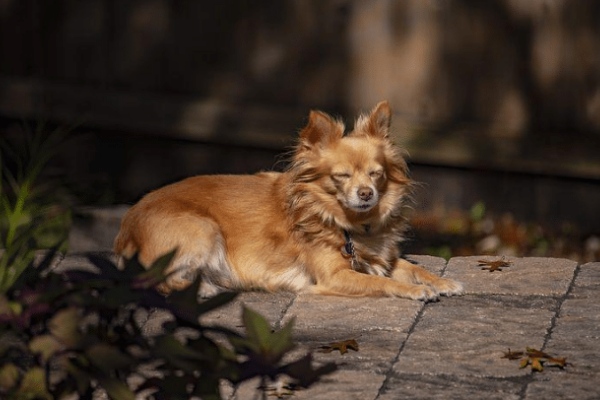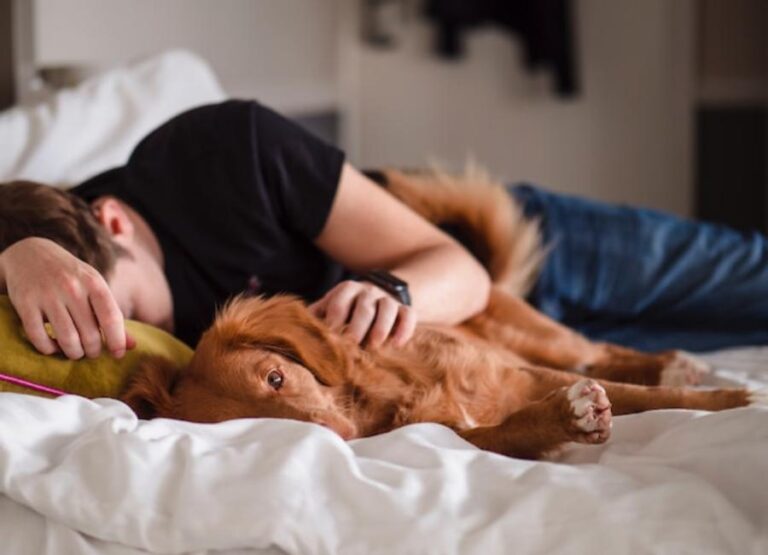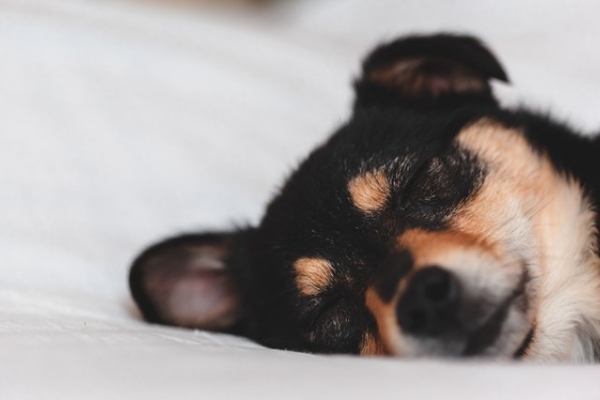Yorkie Separation Anxiety: 6 Signs, Causes & Prevention

Yorkies were bred to hunt rats and stay close to their owners, so Yorkie separation anxiety becomes a problem when they are away from their owners.
I will be discussing the most common signs, causes, and prevention of Yorkie separation anxiety in a very simple way.
So, without wasting much time in the introduction let’s get started with the signs of separation anxiety in Yorkies.
Yorkie Separation Anxiety
Separation anxiety in Yorkies develops when a Yorkie is separated from its owners for an extended period of time, or even when Yorkies are left alone unsupervised for an extended amount of time.
When Yorkies are left alone for a considerable length of time they become agitated and develop separation anxiety which can lead to lots of behavior issues.
If you must leave your Yorkie for some time then you have to keep them busy with something else or follow the steps in this post.
Signs of separation anxiety in Yorkies
Here are some of the most common separation anxiety symptoms in Yorkies to be aware of:
1. Frequently barking on your departure
Because of dread, irritation, stress, tension, and loneliness, most Yorkies with separation anxiety will bark incessantly, which can be a nuisance for both you and your neighbors.
Separation anxiety can develop over time in certain Yorkies, or it might appear minutes after the owner leaves.
Yorkies with separation anxiety may bark excessively when their owners go to work or somewhere else because they are afraid of being alone.
As a result, you should be worried if your Yorkie begins to bark significantly more than usual when you leave or enter.
2. Chewing of items in your absence
Yorkies may scratch, chew, or damage their things or toys if they are away from their owners for a considerable length of time.
Your Yorkie may have chewed the table legs, doors, window sills, and door frames, and even damaged the couch or cushions when you return home.
The most prevalent reasons for hazardous chewing are depression, stress, and loneliness, all of which can be triggered by separation anxiety.
Chewing and digging in your house can lead to injuries such as broken teeth, scrapes, nail or paw damage, and even harm from broken furniture.
3. Trying to escape and leave with you
When your Yorkie is scared or has separation anxiety, he will try everything he can to find you or establish new friends outside the house.
Your Yorkie may hit his head and teeth against the cage bars, harming himself as a result, all in the name of forcing him to leave because he is terrified.
Keep an eye out for your Yorkie wanting to run out and follow you as you leave the home; don’t disregard this indication.
This is a major problem since it means your Yorkie is terrified of being alone, which can develop to separation anxiety.
4. Scratching of doors or walls at your absence
When Yorkies are separated from their owners, they often suffer anxiety and misery, which can lead to clawing at doors and walls.
If your Yorkie has separation anxiety, you’ll notice him clawing the exit door as you leave for work.
You may also see your Yorkie scratching at the walls, which is a sign of anxiety brought on by being alone.
Your Yorkie’s separation anxiety is generating discomfort if you arrive home to find scratches on your walls or doors.
5. Digging up things at your absence
One of the most common causes of your Yorkie digging up your yard, fence posts, bed, or basement is separation anxiety.
They dig to keep themselves engaged and away from boredom or loneliness when they are bored or have nothing better to do.
If you come home to find your Yorkie digging in your yard, cellar, bed, or fence base due to separation anxiety, you must take action.
That’s an obvious sign that your Yorkie is bored, and ignoring it will only aggravate the situation.
6. Potty accidents at your absence
If your Yorkie has been housebroken but continues to have accidents when you leave the house and return home to find them.
This is a clear indication that your Yorkie is concerned about you while you’re gone, and if the problem isn’t handled, it will only become worse.
If your puppy or adult Yorkie becomes terrified and starts eating his or her own feces, keep an eye on him or her.
You can try to avoid this symptom or just cure the underlying cause of your Yorkie’s worry, regardless of how unpleasant it is.
Read more about signs of separation anxiety in dogs.
Let’s discuss some common causes of separation anxiety in Yorkies
Causes of Yorkies separation anxiety
The following are some of the factors that have been connected to the development of separation anxiety in Yorkies:
1. Leaving Yorkies alone frequently
Separation anxiety in Yorkies is caused by being left alone unsupervised for an extended amount of time, and Yorkies must be educated to stay alone.
In summary, you shouldn’t adopt a Yorkie if you plan to be away from home all of the time, because Yorkies are among the finest human friends who want human connection.
Whenever Yorkies are left alone at home with no work or mental stimulation, they develop separation anxiety.
Even while most dog breeds can stay at home for extended periods of time before developing separation anxiety, you should never leave your Yorkie at home without a task for him to complete.
2. Changing city or location
Separation anxiety in Yorkies can be triggered by changing your surroundings or relocating to a new area that your Yorkie perceives as weird.
When relocating to a new home or location, there are several things you can do to prepare your Yorkie to prevent the unwanted behaviors that come with a new setting.
If you want to relocate, for example, you’ll need to train your Yorkie in crate training and other methods.
Separation anxiety can be triggered by a change in location since your Yorkie may lose trust and confidence in you owing to the new environment’s state.
3. Poor vision or ear problems in Yorkies
Yorkies are known to like human connection, and some Yorkies will even follow their owners from room to room.
When a Yorkie develops hearing or vision problems, they may feel as if they are unable to engage with their owners due to their health.
Separation anxiety in Yorkies might be induced if your Yorkie is unable to hear or see you or what is going on around him.
Even when you are present, the Yorkies feel alone because of their health issues, so keep in touch if they have any health challenges.
4. Abuse or neglect from owner
We all know that caring for a Yorkie isn’t always a laugh, especially when looking at it from a financial standpoint.
Keeping up with everything a Yorkie requires, including feeding, grooming, vet visits, and a daily walk, isn’t easy, which is why you shouldn’t acquire a Yorkie unless you’re prepared to take on the responsibility.
This is why people dump their Yorkies on the street because they can’t keep up with them or because they can’t relocate to a new city with them.
Abandoning a Yorkie is a surefire way to cause separation anxiety, especially if the Yorkie has nowhere to go or no one with whom to spend time.
5. Making a big deal out of departures
If you believe your Yorkie is incapable of reading your energy and emotions, you are mistaken.
When you leave or come home, don’t make a big production out of it, since this can make your Yorkie uneasy and can easily induce separation anxiety.
When you leave or return, keep things simple as normal, and avoid huge embraces and hugs, which can induce anxiety in Yorkies.
When you come home or wish to depart, go about your normal routine; don’t make it a huge issue that you’re leaving.
6. Arrival of new family members
This situation may seem absurd to you, yet it is extremely true and occurs in many households.
Yorkies have a hard time trusting humans or other pets, which can lead to hostility or barking at other dogs.
When you bring in new dogs or people that they don’t trust right away, most Yorkies grow jealous and nervous.
You must appropriately introduce any new family member, whether a pet or a person, to avoid undue stress, despair, or separation anxiety.
If a Yorkie doesn’t get along with a new pet or family member, he or she may engage in self-isolation, which can lead to separation anxiety.
Read more about causes of separation anxiety in dogs.
How to prevent separation anxiety in Yorkies
The following are the most popular and suggested methods for coping with separation anxiety in Yorkies:
1. Create a safe and calming spot
Every Yorkie feels secure in their own environment, which is why most unsocialized dogs will not allow other humans or pets into their room or bed.
To help your Yorkie cope with separation anxiety, establish a reference point where he or she connects the location as quiet and pleasant.
Make sure the Yorkie has everything he needs at the reference site, such as a chew toy or soothing music, so he can rapidly recognize it as a secure place.
You can occasionally join your Yorkie in the area, but you should never call the Yorkie out of his safe spot; instead, let the Yorkie come out on its own terms.
2. Concise crate training
This may sound absurd, but believe me when I say that it works when done correctly; good crate training sessions can assist a Yorkie with separation anxiety, but not persistent worry.
Crate training is a popular puppy training strategy that can help with a variety of issues, including separation anxiety.
Crate training may provide a safe and tranquil environment for your Yorkie when you’re gone for an extended period of time.
The goal is for the Yorkie to link fun things like chew toys and food-releasing puzzle games with his kennel, which will encourage him to spend time there.
When Yorkies are left alone, they may feel safer and more at ease, so keep an eye on your puppy’s behavior to see whether his anxiety symptoms improve or worsen.
3. Invest in anti-anxiety products
You may need to give your Yorkie medicine to help them calm if they grow upset when you leave. Your dog can benefit from anti-anxiety drugs.
A veterinarian can assist you and your Yorkie if you and your Yorkie are unable to resolve your Yorkie’s behavioral issues through changes or training.
Before you leave, talk to your veterinarian about what anti-anxiety products or drugs you may give your Yorkie to help them relax.
Get anti-anxiety drugs from your veterinarian and spend more time with your Yorkie to completely remove separation anxiety.
Here are some examples of commonly used anti-anxiety medications:
- Dog anxiety jacket
- Dog-calming collar
- Antianxiety beds
4. Stop all exit signals
All exit signals, such as picking up your keys, should be avoided since they might cause separation anxiety in Yorkies.
Don’t make a big issue about it when you leave for the day or return. During your departure, avoid touching, talking, or making eye contact.
Cesar Way argues that when you return home, you should be teaching your dog that being away isn’t such a big deal.
It’s just another workday! Depending on the severity of the dog’s anxiety, you may need to practice the rule for five minutes or up to an hour before leaving and returning.
5. Make time to be with your Yorkie
Exposing your Yorkie’s brain to a range of stimuli, releasing energy, and interacting with other dogs or people keep it active.
If your Yorkie is naturally enthusiastic, participate in sports with them, such as agility training.
You’ll strengthen your ties while also enhancing your health and those of your loved ones.
Treasure hunt is a fun activity to play with your Yorkie while you’re away.
You might buy a huge bag of treats and hide them across your dog’s territory; this will keep your Yorkie busy and on the lookout all day.
Again, moderation is key, since too many treats may be dangerous.
Separation anxiety can be alleviated by scheduling time to play fetch with your Yorkie.
6. Set up a window view of outside world
Providing your Yorkie with a clean window view of the outside world can go a long way toward keeping him occupied while you go about your business.
Set up a little step for your Yorkie to climb up to the window and view what’s going on in your neighborhood, especially if you live in a busy location during the day.
To do this, you must properly socialize your Yorkie to prevent them from barking at people or other pets they see through the window, as well as make the window easily accessible.
Read more about how to prevent separation anxiety in dogs.





![Dog Drinking a Lot of Water And Not Eating [Explained] Dog Drinking a Lot of Water And Not Eating](https://petcreeks.com/wp-content/uploads/2023/02/Dog-Drinking-a-Lot-of-Water-And-Not-Eating-768x555.jpg)
